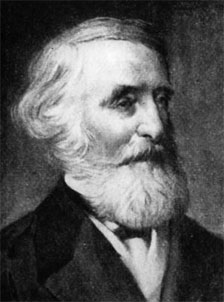| Profile | Major Works | Resources |
George Poulett Scrope, 1787-1876.

Pioneering British geologist, landlord, politician and economist. G. Poulett Scrope was an avid opponent of several tenets of the Ricardian school and a proponent of free banking and poor relief.
He was born George Julius Thomson into an established merchant family, studied at Oxford and then Cambridge, where he first became interested in mineralogy and geology, and developed a special interest in volcanoes. He published two seminal works (1825, 1827) after extensive travels in Italy and France examining volcanic activity and formations.
He changed his name after 1822, when he married Emma Phipps Scrope, heiress of William Scrope (pronounced "Scroop") of Castle Combe in Wiltshire. George Poulett Scrope (as he now called himself) took up the public duties of a county squire as landlord, magistrate and deputy lord lieutenant of Wiltshire. His practical concern with the rural poverty that confronted him daily drew him to political economy for answers. But his delving into the writings of the Ricardian school left him very disappointed.
A Tory by social position and instinct, but Whig by allegiance, Scrope sought to formulate an alternative political economy, a middle way between the Ricardians' Whiggish faith in laissez faire markets and the "organic paternalism" of Tory reactionaries like Carlyle. For this, Scrope drew on utilitarian rather than traditionalist arguments (his brother, Charles Syndeham, future governor-general of Canada, moved in Bentham's circle and infected him with that notion). The end of political economy, he argued, was maximum happiness, not maximum wealth. The latter can be a conduit to the former, but it is not an automatic assumption. He gave a political-economic twist to the old concept of nobless oblige, the paternal duty of the rich towards the poor. He argued that the "compliance and loyalty" of the poor is what made private property secure and thus the accumulation of capital possible to begin with. Consequently abandoning rural labor to the vicissitudes of the market was not only unjust from a utilitarian point of view, it would also lead to a brutalized and rebellious working class that would endanger England's prosperity.
Scrope delivered his views in 1831-32, in a series of pamphlets and articles for the Quarterly Review, a Tory rag. These culminated in his main work, Principles of Political Economy (1833).
He was particularly disgusted by Ricardian embrace of the Malthusian "iron law of wages", which he felt unduly blamed the poor for their poverty and exonerated the rest of society from any responsibility for their plight. Once Senior had condemned the doctrine, Scrope felt emboldened and, in 1831, launched his Quarterly Review attacks on "that most pernicious dogma which has long been palmed upon the public as the fundamental axiom of political economy" (1833: xvi). The Malthusian wage-fertility dynamics, whether as originally conceived of by Malthus, modified by Sadler and defended by Chalmers, were all wrong, Empirically, Scrope argued, the means of subsistence grew faster than the natural population growth rate and the starving multiplied faster than the well-provided for. He also ridiculed "moral restraint" as a distraction.
Confident that the growth of capital was for the betterment of all, Scrope also assailed the Ricardian doctrine of diminishing profits. Diminishing returns, Scrope argued, did not necessarily set in in agriculture. If they set in, they were "trifling" and the benefits of industrial concentration and foreign sources would counterbalance them. He did concede, however, that protection against foreign importation may exacerbate this.
Scrope (1832, 1833) also delved into the Currency-Banking school debates of the 1830s, coming out against almost all the proposed restrictions. Confident in the real bills doctrine, Scrope advocated a free banking system, with competitive, unrestricted note issue. If confidence was an issue, then let banks deposit government securities to back their note-issues,
In 1832, fired up by the debate with the economists, George Poulett Scrope ran for parliament, contesting Stroud, in Gloucestershire, against a son of David Ricardo. Scrope lost, but an inquiry into the electoral process forced Ricardo Jr. to resign. Scrope ran again and won the seat in 1833, which he would retain it until 1868.
Scrope entered parliament right after the reform bill had placed that institution largely in the hands of the bourgeoisie (true to his "new" social position, Scrope had not been very keen on extending the franchise). He was immediately caught up in the debate to overhaul the Elizabethan Poor Laws. The Whigs wanted to do away with them altogether and throw the poor on the labor market. Scrope rose to the defense of the Poor Laws. Or rather, he proposed to reform them, not dismantle them. In his view, the chief evil of their design was not that they encouraged idleness and dependence among the poor, but rather that it encouraged private businesses to drive wages to zero, counting on the parishes to make up for the difference. He thus denounced them as a hidden "slavery" in the countryside. He agreed that "wage subsidies" should be abandoned, but insisted that poor relief remain in the hands of parish government and not private charity ("friendly societies"), as the Whigs had proposed. The poor are still the state's obligation and the rates should be used to finance public works projects to give them employment. Presciently, Scrope also outlined how a national insurance scheme, designed in the modern sense, could replace poor relief.
When the Poor Law Reform Act was finally passed in 1834, Scrope was not so happy with the result. He found the "workhouses" concept deplorable and condemned them accordingly.
|
Major Works of George Poulett Scrope
|
|
HET
|
|
Resources on G. Poulett Scrope
|
All rights reserved, Gonšalo L. Fonseca
